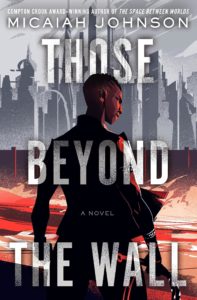
This review is based on an eARC (Advance Reading Copy) provided by the publisher via NetGalley in exchange for an honest review. Those Beyond the Wall will be released on March 12, 2024.
Almost three years ago, I was absolutely stunned by Micaiah Johnson’s debut novel, The Space Between Worlds. So even though her standalone sequel promised a very different sort of plot from a very different perspective, there was no question about whether to give Those Beyond the Wall a try.
Those Beyond the Wall takes place years after The Space Between Worlds, with the major characters from the first book taking on secondary roles here and the primary point of view provided by Mr. Scales, an Ashtown enforcer with plenty of righteous anger directed at the wealthy Wiley City where she spent her youth. When bodies start showing up dead and brutally disfigured, it’s clear that something dangerous is happening with the multiverse travel that was the focus of the first book. And that danger threatens both Wiley City and Ashtown, bringing the simmering class conflict to the forefront in a political struggle that may mean Ashtown’s salvation or their total destruction.
I alluded in the opening to a very different plot from The Space Between Worlds, and it is indeed a wildly different sort of book, despite being set in the same world. The Space Between Worlds certainly included a struggle against people abusing their power, but the heart of the story was an exploration of how the characters’ lives played out differently in slightly different worlds. Those Beyond the Wall includes almost nothing of this, for all that the inciting threat comes from another world. Instead, the focus is almost entirely on Ashtown’s internal politics and their struggle against Wiley City.
And there are times where the very different plot works well. Johnson’s prose style is just as propulsive and powerful as in the first book, even with a perspective character just as concerned with her relationships with a pair of fellows as she is the overarching conflict. And the narrative focus on the power of stories is wonderfully woven throughout, from Scales’ various explanations for how she got her name to the battle for control of the narrative that would serve a central role in the novel’s primary conflict. It’s a powerful element of Those Beyond the Wall, while it’s easy to see how the message is meant to apply to the real world, it comes across as storytelling more than preaching.
On the other hand, there are plenty of elements that do feel like preaching, to the point of breaking immersion more than once. Scales often feels like an author mouthpiece, and there are times where her commentary feels more directed at our world than hers—it was odd, for example, to hear the caustic commentary directed at white Christians in a story where almost every major character was atheist and the remainder were part of a mystical religion that didn’t believe the Bible. That same feeling of the lead as an author mouthpiece also makes it more to swallow her uncritical conviction that the extreme violence in Ashtown’s power structure is ultimately for the good of the people. There’s nothing wrong with a morally gray lead, but this felt like a gray lead being propped up as a moral authority.
And while the focus on the Ashtown/Wiley conflict made for an interesting main story, there were times that the details felt a little off. The deadly incursion from another world kicked off the plot and provided the impetus for so much of the conflict, but there were times it felt like a sideshow, being rushed along in order to get to the next stage of the Ashtown/Wiley conflict. And when the major figures from The Space Between Worlds did reappear, at least one was nearly unrecognizable from the first book. Some of that is explicable in terms of the perspective shift, but I’m not quite sure it explains everything.
Ultimately, Those Beyond the Wall has flashes of the brilliance that characterized The Space Between Worlds, but it’s quite a bit messier, with key plot elements given short shrift, some confusing character decisions, and a main point-of-view character expected to bear more weight than she’s probably able. The strengths are enough to incline me to round up, but this one is firmly in the 3.5-star range after the first hit five.
Recommended if you like: class warfare with pointed political commentary.
Can I use it for Bingo? It’s hard mode for POC Author and is a Sequel in a Queernorm Setting. Wait a couple weeks and it will doubtless hit next year’s Published in 2024 square.
Overall rating: 14 of Tar Vol’s 20. Four stars on Goodreads.
